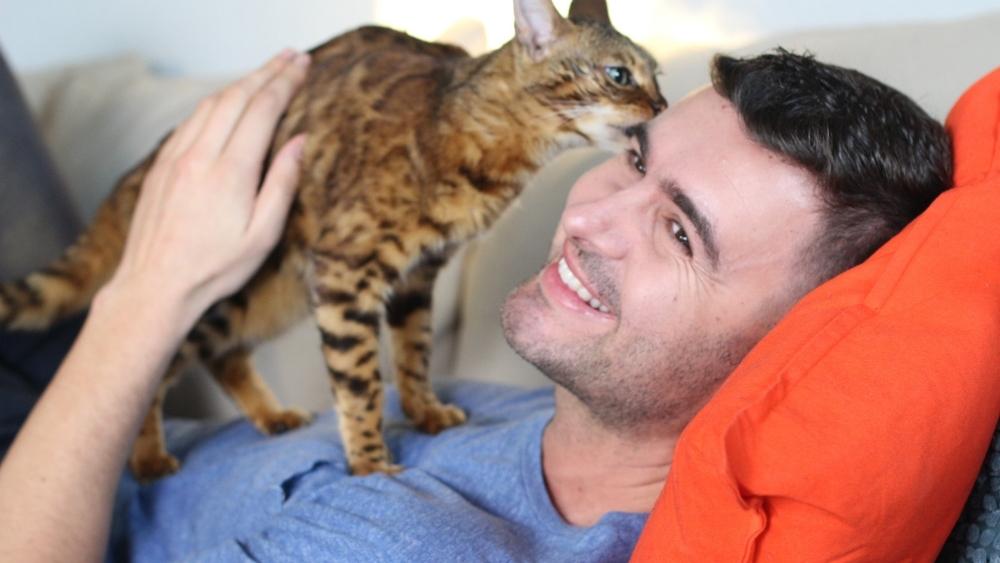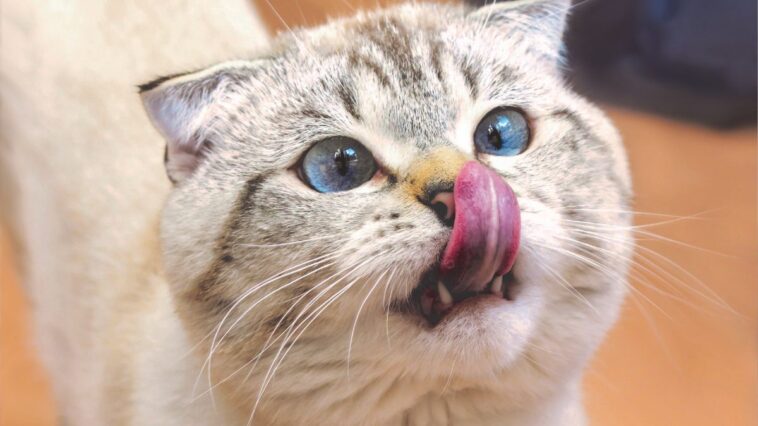Cats are known for their curious and sometimes quirky behavior; one of the most common and perplexing behaviors is licking. If a cat has ever licked you, you may have wondered why they do it and what it means. Does it mean they love you, or is there another reason behind this behavior?
In this post, we’ll explore the question, “Why does my cat lick me?” We’ll delve into the science behind your cat’s licking behavior and examine the seven most common reasons why your cat may be licking you. We’ll also answer some frequently asked questions about cats and licking.
Understanding why your cat licks you and how to respond appropriately can deepen your relationship with your feline friend and ensure they receive the care and attention they need. So, let’s dive in and explore the fascinating world of cats and their licking behavior!
The Science Behind Your Cat’s Licking Behavior

Cats are known for their grooming habits, and licking is a significant part of their behavior. But why do cats lick, and what is the science behind this behavior? In this section of the post on Why Does My Cat Lick Me? We’ll explore the functions of licking in cats and what they can tell us about our feline friends.
First and foremost, licking is a natural grooming behavior for cats. Cats lick each other in the wild to keep their fur clean and parasite-free. Licking also helps distribute oils throughout the coat, keeping it healthy and shiny. When cats lick their owners, they are essentially grooming them, too. They may also lick to remove dirt, debris, or other substances from your skin or hair.
In addition to grooming, licking serves several other functions in cats. One of these is temperature regulation. When a cat licks its fur, the saliva evaporates and cools the skin, helping it regulate its body temperature. This is why cats may lick themselves more frequently on hot days or after exercise.
Another function of licking in cats is bonding. When a cat licks its owner, it exchanges scent and builds trust. Cats have scent glands on their skin and saliva, so when they lick their owners, they mark them with their scent. This can help strengthen the bond between the cat and the owner.
Licking can also be a form of stress relief for cats. When anxious or stressed, cats may lick themselves excessively or lick other objects, such as furniture or clothing—licking releases endorphins, creating a sense of pleasure and comfort for the cat and the owner.
Finally, excessive licking can indicate health issues like allergies, skin irritations, or dental problems. If your cat is licking itself excessively or compulsively, it’s best to consult with a veterinarian to rule out any underlying health problems.
In summary, the science behind your cat’s licking behavior is multifaceted and serves several important functions. From grooming and temperature regulation to bonding and stress relief, licking is a natural and essential behavior for cats. By understanding the reasons behind your cat’s licking, you can better care for and bond with your feline friend.
7 Reasons Why Does My Cat Lick Me?
We’ll explore seven reasons why your cat may be licking you. Understanding these reasons can help you better understand your cat’s behavior and strengthen the bond between you and your furry friend.
Grooming: As we mentioned earlier, cats are natural groomers, and they may lick you as a way of grooming you. This is a sign of affection and can be a way for your cat to show that they care about you.
Marking territory: Cats have scent glands on their skin and saliva; they mark you with their scent when they lick you. This can be a way for your cat to claim you as their territory and to communicate to other cats that you are theirs.
Affection: Cats may also lick you as a sign of affection. Licking can be a way for your cat to show that they love you and enjoy being close to you.
Seeking attention: Cats may also lick you to seek attention. If your cat wants to be petted or played with, it may lick you to get your attention and communicate its desire for interaction.
Stress relief: Licking can be a form of stress relief for cats, and if your cat is feeling anxious or stressed, they may lick you to calm themselves down.
Health issues: Excessive licking can indicate health issues like allergies or skin irritations. If your cat is licking you excessively, to ensure there are no underlying health issues, it is recommended to seek advice from a veterinarian.
Habit: Finally, some cats may lick their owners simply out of habit. If your cat has been licking you for a long time, it may have developed a habit and may continue to do it even if there is no specific reason.
Your cat may lick you for various reasons, such as grooming, marking territory, seeking attention, and relieving stress. Understanding these reasons can help you better bond with your cat and give them the care and attention they need.
How to Respond When Your Cat Licks You
Do you know how to react when your cat licks you? By responding appropriately, you can strengthen your relationship with your beloved pet and show them that you value and love them.
- Show affection: When your cat licks you, it’s often a sign of affection. In response, you can show your cat you love them by petting, cuddling, or talking gently and reassuringly.
- Redirect their behavior: If your cat licks you excessively, you can redirect their behavior by offering them a toy or treat to distract them. This can help break the licking habit and encourage your cat to behave more appropriately.
- Set boundaries: If your cat’s licking behavior is bothering you, it’s important to set boundaries and communicate your needs to your cat. You can gently move your cat away from you or redirect their attention to another activity.
- Address underlying health issues: If your cat licks you excessively, it may indicate underlying health issues, such as allergies or skin irritations. It’s important to consult a veterinarian to rule out any underlying health problems and ensure your cat receives appropriate treatment.
- Avoid punishment: It’s important to avoid punishing your cat for licking you, as this can be confusing and may damage the bond between you and your cat. Instead, focus on positive reinforcement and redirecting their behavior positively and gently.
Responding appropriately when your cat licks you can help you build a stronger bond with your furry friend and ensure they feel loved and cared for. By showing affection, setting boundaries, redirecting their behavior, and addressing any underlying health issues, you can help your cat develop positive habits and behaviors that will benefit both of you in the long run.
Frequently Asked Questions About Cats and Licking
We’ll answer frequently asked questions about cats and their licking behavior. Understanding the answers to these questions can help you better care for your feline friend and deepen your understanding of their behavior.
- Is it safe to let my cat lick me?
In general, it is safe to let your cat lick you. However, if your cat has any health issues, such as dental problems or skin irritations, it’s best to avoid letting them lick you until they are resolved.
- Why does my cat lick me and then bite me?
Sometimes cats may lick their owners and then bite them. This behavior can be a sign of overstimulation or aggression and may be a warning sign that your cat needs space.
- Is it normal for my cat to lick me all the time?
It’s normal for cats to lick their owners occasionally, but excessive licking can indicate health issues or stress. If your cat is licking you excessively, For the best outcome, it’s recommended that you seek advice from a veterinarian to confirm if there are any underlying health issues.
- Should I let my cat lick my face?
It’s generally best to avoid letting your cat lick your face, as this can transfer bacteria and parasites to your skin. Limiting their licking to areas covered by clothing is best if you allow your cat to lick you.
- Can I train my cat to stop licking me?
You can discourage your cat from licking you by redirecting its behavior with toys or treats. It’s important to be consistent and patient when training your cat and to reward them when they exhibit the desired behavior.
To improve your relationship with your cat and understand their licking behavior, familiarize yourself with these frequently asked questions. Providing your cat with the necessary care and attention can help strengthen your bond and promote a happy and healthy relationship.
Conclusion
Cats are known for their grooming behavior; licking is natural and spontaneous. When cats lick their owners, it can signify affection, bonding, and trust. However, excessive licking may also indicate stress, health issues, or overstimulation.
Understanding why your cat licks you and how to respond appropriately can help you build a stronger relationship with your furry friend and ensure they receive the care and attention they need. By providing your cat with appropriate toys, treats, and activities, setting boundaries, addressing any underlying health issues, and responding with affection and positive reinforcement, you can ensure that your cat’s licking behavior is appropriate and healthy for both you and your cat.




